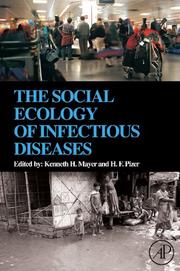| Listing 1 - 10 of 120 | << page >> |
Sort by
|
Multi
ISBN: 9781400858378 9780691609935 9780691638126 1400858372 0691054843 9780691054841 0691609934 Year: 1987 Publisher: Princeton, New Jersey : Princeton University Press,
Abstract | Keywords | Export | Availability | Bookmark
 Loading...
Loading...Choose an application
- Reference Manager
- EndNote
- RefWorks (Direct export to RefWorks)
Ann Jannetta suggests that Japan's geography and isolation from major world trade routes provided a cordon sanitaire that prevented the worst diseases of the early modern world from penetrating the country before the mid-nineteenth century. Her argument is based on the medical literature on epidemic diseases, on previously unknown evidence in Buddhist temple registers, and on rich documentary evidence from contemporary observers in Japan.Originally published in 1987.The Princeton Legacy Library uses the latest print-on-demand technology to again make available previously out-of-print books from the distinguished backlist of Princeton University Press. These editions preserve the original texts of these important books while presenting them in durable paperback and hardcover editions. The goal of the Princeton Legacy Library is to vastly increase access to the rich scholarly heritage found in the thousands of books published by Princeton University Press since its founding in 1905.
Book
ISBN: 9780198819660 0198819668 0192551582 0191859982 Year: 2018 Publisher: Oxford: Oxford university press,
Abstract | Keywords | Export | Availability | Bookmark
 Loading...
Loading...Choose an application
- Reference Manager
- EndNote
- RefWorks (Direct export to RefWorks)
In this study, Samuel K. Cohn, Jr. investigates hundreds of descriptions of epidemics reaching back before the fifth-century-BCE Plague of Athens to the 2014 Ebola outbreak to challenge the dominant hypothesis that epidemics invariably provoke hatred, blaming of the 'other', and victimizing bearers of epidemic diseases.
Epidemics --- History --- Social aspects --- history --- Communicable Diseases --- Épidémies --- Maladies infectieuses --- psychology --- Histoire. --- Psychologie. --- Epidemiology --- World history --- Epidemics - History --- Epidemics - Social aspects - History --- Epidemics - history --- history. --- psychology.
Book
ISBN: 9789004508316 9004508317 Year: 2021 Publisher: Leiden: Nijhoff,
Abstract | Keywords | Export | Availability | Bookmark
 Loading...
Loading...Choose an application
- Reference Manager
- EndNote
- RefWorks (Direct export to RefWorks)
We are currently living in a new normal. The Covid-19 pandemic has led to millions of deaths and is changing how we live, work, socialise and move through the world. But Covid-19 is one of many epidemics to have shaped human life throughout history, causing untold suffering and death and changing how we live. Their effects are seldom limited to one country or region, and how societies prevent, manage and recover from epidemics is inevitably influenced by international law. Epidemics are regulated not only by international health law but also by international human rights law, international environmental law, international trade and investment law, international transport law, international law of peace and security and international humanitarian law. Despite this, they have received limited attention in mainstream international legal scholarship. This volume provides a comprehensive examination of epidemics and international law from the perspective of general international law. Featuring thirty-one essays by researchers from around the world and from various areas of expertise, it demonstrates how epidemics shape - and are shaped by - international legal norms across varying domains of international law. This volume is the product of collaborative work conducted between August 2020 and April 2021 as part of the Centre for Studies and Research on Epidemics and International Law.
Epidemics. --- International law. --- International law --- Epidemiology
Book
ISBN: 0631178805 9780631178804 Year: 1976 Publisher: Garden City, N.Y.: Anchor press,
Abstract | Keywords | Export | Availability | Bookmark
 Loading...
Loading...Choose an application
- Reference Manager
- EndNote
- RefWorks (Direct export to RefWorks)
Epidemics --- Civilization --- History --- World history --- Epidemics - History --- Civilization - History --- Epidemies --- Histoire

ISBN: 9780123704665 0123704669 9780080557144 0080557147 1281144746 9786611144746 Year: 2008 Publisher: Boston ; Amsterdam ; London : Academic Press,
Abstract | Keywords | Export | Availability | Bookmark
 Loading...
Loading...Choose an application
- Reference Manager
- EndNote
- RefWorks (Direct export to RefWorks)
Social Ecology of Infectious Diseases explores how human activities enable microbes to disseminate and evolve, thereby creating favorable conditions for the diverse manifestations of communicable diseases. Today, infectious and parasitic diseases cause about one-third of deaths and are the second leading cause of morbidity and mortality. The speed that changes in human behavior can produce epidemics is well illustrated by AIDS, but this is only one of numerous microbial threats whose severity and spread are determined by human behaviors. In this book, forty experts in the fields of infe
General ecology and biosociology --- Communicable diseases. --- Epidemics. --- Social ecology. --- Communicable diseases --- Transmission. --- Epidemics --- Social ecology
Book
ISBN: 9781583679029 9781583679036 9781583679043 Year: 2020 Publisher: New York, N.Y. Monthly Review Press
Abstract | Keywords | Export | Availability | Bookmark
 Loading...
Loading...Choose an application
- Reference Manager
- EndNote
- RefWorks (Direct export to RefWorks)
A history of COVID-19 and the sociopolitical crises that led to the 2020 global pandemicThe COVID-19 pandemic shocked the world. It shouldn't have. Since this century's turn, epidemiologists have warned of new infectious diseases. Indeed, H1N1, H7N9, SARS, MERS, Ebola Makona, Zika, and a variety of lesser viruses have emerged almost annually. But what of the epidemiologists themselves? Some bravely descended into the caves where bat species hosted coronaviruses, including the strains that evolved into the COVID-19 virus. Yet, despite their own warnings, many of the researchers appear unable to understand the true nature of the disease-as if they are dead to what they've seen.Dead Epidemiologists is an eclectic collection of commentaries, articles, and interviews revealing the hidden-in-plain-sight truth behind the pandemic: Global capital drove the deforestation and development that exposed us to new pathogens. Rob Wallace and his colleagues-ecologists, geographers, activists, and, yes, epidemiologists-unpack the material and conceptual origins of COVID-19. From deepest Yunnan to the boardrooms of New York City, this book offers a compelling diagnosis of the roots of COVID-19, and a stark prognosis of what-without further intervention-may come.
Sociology of health --- Economics --- Epidemiology --- COVID-19 (Disease) --- Epidemics. --- Epidemiology.
Book
ISBN: 9783110364347 3110364344 3110364522 3110399199 Year: 2014 Volume: 64 Publisher: München: Oldenbourg,
Abstract | Keywords | Export | Availability | Bookmark
 Loading...
Loading...Choose an application
- Reference Manager
- EndNote
- RefWorks (Direct export to RefWorks)
History of human medicine --- History of Europe --- anno 1900-1999 --- Epidemics --- History --- Epidemics - Europe - History - 20th century
Book
ISBN: 9781682194096 9781509549078 9781509549061 1682194094 1509549072 1509549064 Year: 2020 Publisher: New York: Polity press,
Abstract | Keywords | Export | Availability | Bookmark
 Loading...
Loading...Choose an application
- Reference Manager
- EndNote
- RefWorks (Direct export to RefWorks)
What do sex doll sales, locust swarms, and a wired-brain pig have to do with the coronavirus pandemic? Everything—according to that “Giant of Lubliana,” the inimitable Slovenian philosopher Slavoj Žižek.In this exhilarating sequel to his acclaimed Pandemic!: COVID-19 Shakes the World, Žižek delves into some of the more surprising dimensions of lockdowns, quarantines, and social distancing—and the increasingly unruly opposition to them by “response fatigued” publics around the planet.Here, Žižek examines the ripple effects on the food supply of harvest failures caused by labor shortages and the hyper-exploitation of the global class of care workers, without whose labor daily life would be impossible. Through such examples he pinpoints the inability of contemporary capitalism to effectively safeguard the public in times of crisis.Writing with characteristic daring and zeal, Žižek ranges across critical theory, pop-culture, and psychoanalysis to reveal the troubling dynamics of knowledge and power emerging in these viral times.
COVID-19 (Disease) --- Epidemics --- Capitalism. --- Economic aspects. --- Social aspects. --- Political philosophy. Social philosophy --- Philosophy and psychology of culture --- COVID-19 (Disease) - Economic aspects. --- COVID-19 (Disease) - Social aspects. --- Epidemics - Economic aspects. --- Epidemics - Social aspects.

ISBN: 0866980504 9780866980500 Year: 1982 Volume: 13 Publisher: Binghamton: State university of New York at Binghamton. Center for medieval and early renaissance studies,
Abstract | Keywords | Export | Availability | Bookmark
 Loading...
Loading...Choose an application
- Reference Manager
- EndNote
- RefWorks (Direct export to RefWorks)
History of civilization --- anno 1300-1399 --- Black death --- Plague --- History --- history --- -Epidemics --- Medicine, Medieval --- history. --- Conferences - Meetings --- -history. --- Black Death --- Epidemics --- Black death - History --- Plague - history - congresses

ISBN: 0195074912 0195074904 9780195074918 Year: 1995 Publisher: New York (N.Y.) : Oxford university press,
Abstract | Keywords | Export | Availability | Bookmark
 Loading...
Loading...Choose an application
- Reference Manager
- EndNote
- RefWorks (Direct export to RefWorks)
Epidemiology --- Mathematical statistics --- Epidemiologic Methods --- 616-036.22 --- Epidemics. Epidemiology --- 616-036.22 Epidemics. Epidemiology --- Diseases --- Public health --- Handbooks, manuals, etc --- Handbooks, manuals, etc. --- Epidemiology - Handbooks, manuals, etc.
| Listing 1 - 10 of 120 | << page >> |
Sort by
|

 Search
Search Feedback
Feedback About UniCat
About UniCat  Help
Help News
News